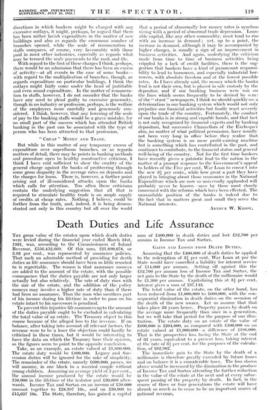Death Duties and Life Assurance
TuE gross value of the estates upon which death duties were levied during the financial year ended March 31st, 1931, was, according to the Commissioners of Inland Revenue, £556,452,669. Of this sum, £21,890,078, or 3.93 per cent., was represented by assurance policies. That such an admirable method of providing for death duties as life assurance should have been so little resorted to is regrettable. The reason is that assurance moneys are added to the amount of the estate, with the possible consequence that the duties payable are not only larger actually but also relatively. The rate of duty rises with the size of the estate, and the addition of the policy moneys may involve a higher rate of duty than if there had been no assurance. Thus the man who sacrifices part of his income during his lifetime in order to pass on his estate intact to his successors is penalized.
To prevent this injustice life assurances up to the amount of the duties payable ought to be excluded in ealculating the total value of an estate. The Treasury object to this course because of the alleged loss to the revenue. If on balance, after taking into account all relevant factors, the revenue were to be a loser the objection could hardly be criticized in these times, but it would be interesting to have the data on which the Treasury base their opinion, as the figures seem to point to the opposite conclusion.
Take, as an example, an estate valued at £1,000,000. The estate duty would be £400,000. Legacy and Suc- cession duties will be ignored for the sake of simplicity. The remainder of the estate, namely £600,000, passes, we will assume,- in one block to a married couple without young children. Assuming an average yield of 5 per cent., the annual income produced by the estate would be £50,000 in the lifetime of the testator and £30,000 after- wards. Income Tax and Surtax on an income of £50,000 amount together to 128,397 10s., and on £30,000 to £15,697 10s. The State, therefore, has gained a capital sum of £400,000 in death duties and lost £12,700 per annum in Income Tax and Surtax.














































 Previous page
Previous page